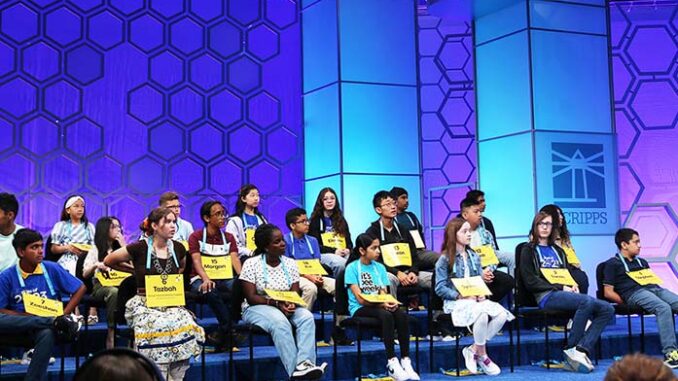
NATIONAL HARBOR, Md. – Opal Mishra stood under the stage lights at the 2023 Scripps National Spelling Bee Tuesday, waiting to hear the word that could mark the end of months of hard work and preparation or let her advance to the next round.
A moment of silence fell over the ballroom before it was broken by the announcer giving the sixth grader her word – hyssop, a European mint.
Unlike the first three spellers of the day, Opal didn’t ask for the word origin or the definition. She took a deep breath and confidently spelled “h-y-s-s-o-p,” sparking an eruption of applause as the first to correctly spell a word in the 95th annual bee.
“I just try not to feel nervous,” the Basha Accelerated Middle School sixth grader said after Tuesday’s first round. “I don’t really feel nervous.”
Opal, 12, was the youngest of the three Arizona middle schoolers who were among the 229 young spellers from around the U.S. and a handful of foreign countries competing at the bee.
In addition to their familiar turn in front of the microphone, when often-nervous contestants have to spell out a word, competitors in the second round were given another word and had to choose the correct definition from among three choices.
Before they came to Washington, the spellers also had to take a written test that allowed bee organizers to gauge the level of difficulty of words to be used in the competition.
But some words were clearly harder than others, as Tazbah Spruhan from Tséhootsooí Middle School in Window Rock learned when she was given the word “Groenendael” to spell in the first round.
“On stage it’s very nerve-wracking because I heard the words other people were getting and I thought, ‘Maybe I got this,’” said Tazbah, 13, an eighth grader. “But then I got a really hard word so that was a little disappointing.”
Tazbah took the precautionary steps of most spellers, asking for the definition and the root of Groenendael – a breed of Belgian sheepdog. Ultimately, it did not help, as she spelled the word “Grunendoll” and heard the dreaded bell indicating a misspelling.
She was clearly upset after her loss, but recovered quickly and returned Tuesday afternoon to cheer on her fellow Arizona spellers in round three.
Opal and Arizona’s third competitor, Karen Baaba Opoku-Appoh, both survived the first three rounds Tuesday and will compete Wednesday morning in the quarterfinals. That round is followed by the semifinals Wednesday night and that national finals on Thursday.
Organizers said this is the first time in several years that two Arizona spellers have advanced to the quarterfinals.
Tuesday was not the first time Opal and Karen have faced off against one another – both spellers qualified for the national bee after competing in the Arizona Educational Foundation’s Arizona Spelling Bee in March.
Karen, 14, said she competed in her first bee in fourth grade. Now an eighth-grade student at Marana Middle School, she said she prepares before every bee by studying as many terms and definitions as she can from Merriam-Webster’s Dictionary. a tactic that won her first place over the 26 other spellers in the Arizona Spelling Bee.
“Make sure you learn the root words because they are really helpful and then make sure you know all the origins of the words and if you have good memorization skills, definitely make sure you memorize a lot of the words,” she said.
Karen advanced to the semifinals by correctly spelling “wapiti” and “cyclical” and currently defining “immolate” through the first three rounds. She said she spent her time between rounds studying the dictionary.
“I used the Merriam-Webster’s Dictionary and then I also used the official word app, called Word Club, and then I used another website called HighScope, so yeah those were my main study resources,” she said.
Tazbah, who prepared for the bee by studying various language spelling patterns, said she was disappointed to get “a really hard word” in the first round. But the Navajo teen – the only Native American in this year’s competition, according to organizers -was still proud to be representing her Native American culture on the national stage.
“I’m very proud to be representing my people because we don’t have a lot of representation, or good representation, so I just feel proud to be here and to be Native here,” Tazbah said.

